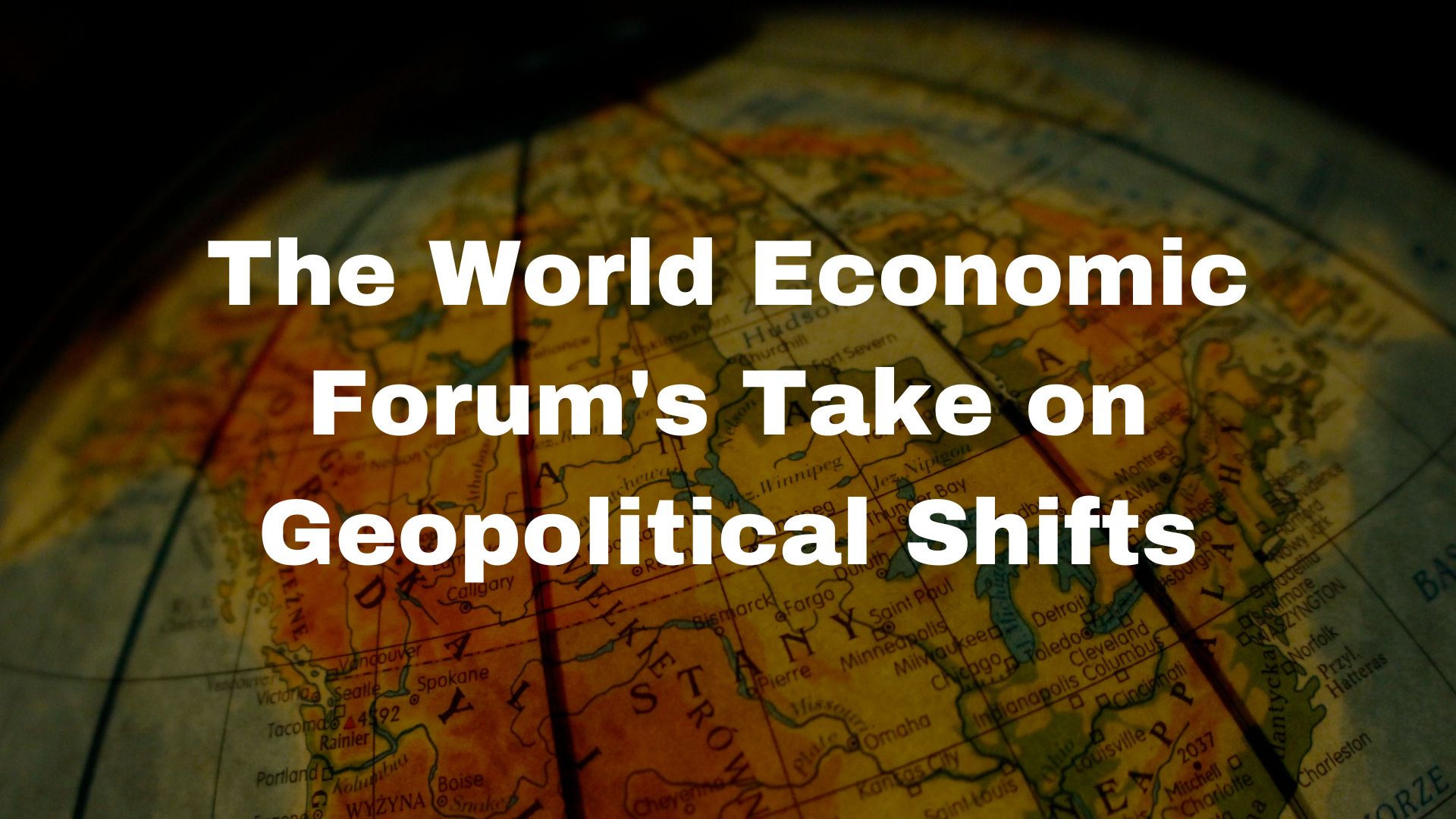
The World Economic Forum's Take on Geopolitical Shifts
The World Economic Forum (WEF) has been at the forefront of analysing and addressing the profound geopolitical shifts shaping our world today. As an independent international organisation, the WEF engages business, political, academic, and other leaders to collaboratively improve the state of the world. In recent years, the global landscape has experienced significant transformations, prompting the WEF to delve deeper into understanding these changes and their implications.
Understanding Geopolitical Shifts
Geopolitical shifts refer to changes in the global political and economic order influenced by factors such as the rise and fall of nations, economic power transitions, technological advancements, and evolving alliances. These shifts can lead to alterations in global trade routes, economic policies, and international relations. The WEF emphasizes that understanding these dynamics is crucial for leaders and organizations worldwide to navigate the complexities of our interconnected world.
Key Dynamics Informing Leaders' Actions in 2025
In its analysis, the WEF identifies three primary dynamics that should inform leaders' actions in 2025:
-
Advancing Security within a Fragmenting Global Order:
The current global order is experiencing fragmentation, leading to challenges in maintaining security and stability. Leaders must adapt to this evolving landscape by fostering collaboration and resilience.
-
Understanding Sovereignty in the Contemporary World:
The concept of sovereignty is being redefined in the face of globalization, technological advancements, and transnational challenges. Leaders need to balance national interests with global responsibilities.
-
Restoring and Redesigning Trade and Economic Globalization:
With the rise of protectionist policies and trade tensions, there's a pressing need to restore trust in global trade systems and redesign them to be more inclusive and equitable.
Impact on Global Trade and Economic Stability
Geopolitical fragmentation has significant repercussions on global trade routes, leading to increased carbon emissions and economic instability. Middle powers are leveraging their positions to navigate geopolitical tensions and pursue economic interests. The WEF's Global Risks Report highlights that such fragmentation contributes to economic instability, as traditional alliances and trade agreements are reevaluated.
The Role of Middle Powers
Middle powers, such as regional leaders and emerging economies, are increasingly asserting their influence on the global stage. They are navigating geopolitical tensions by forming new alliances and pursuing economic interests that align with their national agendas. This shift challenges the traditional dominance of established powers and introduces new dynamics into international relations.
Challenges to Democratic Processes
The rise of misinformation poses a significant threat to democratic processes worldwide. With major elections taking place globally, the spread of false information can undermine public trust and disrupt electoral integrity. The WEF emphasizes the need for robust measures to combat misinformation and protect the foundations of democracy.
The Importance of a 'Geopolitical Radar' for Businesses
In an era of uncertainty and geopolitical shocks, businesses must develop a strong "geopolitical radar" to anticipate risks and identify opportunities. The WEF advocates for this proactive approach, suggesting that it can provide companies with a competitive edge and enhance their resilience in a volatile global market.
The Concept of a Geopolitical Recession
The term "geopolitical recession" refers to a period characterized by heightened geopolitical tensions, conflicts, and instability, leading to reduced international cooperation and economic challenges. The WEF warns that the world may be entering such a phase, with global institutions and governance structures struggling to adapt to shifting power dynamics.
End Note
The World Economic Forum's analysis underscores the profound impact of geopolitical shifts on global stability, economic policies, and international relations. By understanding these dynamics and proactively addressing the associated challenges, leaders and organizations can navigate the complexities of our evolving world and contribute to a more stable and prosperous global community.
In case of any query regarding The World Economic Forum's Take on Geopolitical Shifts, feel free to connect with our legal experts, Tulja Legal, at +91 96380-69905
About the Author
Anju S Nair
Legal Researcher | LLB, MA English| Corporate Lawyer | Business Enthusiast | Founder & CEO at iLawbook.
FAQs
-
What are geopolitical shifts?
-
Geopolitical shifts involve changes in the global political and economic landscape, influenced by factors like the emergence of new powers, technological advancements, and evolving alliances.
-
-
Why are geopolitical shifts important?
-
They impact global trade, security, and international relations, affecting economic stability and the balance of power worldwide.
-
-
How does the WEF view current geopolitical shifts?
-
The WEF sees them as significant factors influencing global stability, economic policies, and international cooperation.
-
-
What challenges arise from geopolitical fragmentation?
-
Challenges include disrupted trade routes, increased carbon emissions, economic instability, and weakened international alliances.
-
-
How can businesses navigate geopolitical risks?
-
By developing a "geopolitical radar," businesses can anticipate risks, adapt strategies, and maintain competitiveness in a volatile environment.
-
-
What is a geopolitical recession?
-
A period marked by heightened geopolitical tensions and reduced international cooperation, leading to economic challenges and instability.
-
-
How do geopolitical shifts affect global trade?
-
They can lead to the reevaluation of trade agreements, the emergence of protectionist policies, and disruptions in global supply chains.
-
-
What role do middle powers play in geopolitical shifts?
-
Middle powers are asserting more influence by forming new alliances and pursuing independent economic policies, challenging traditional power structures.
-
-
How does misinformation relate to geopolitical shifts?
-
Misinformation can exacerbate geopolitical tensions by undermining democratic processes and spreading false narratives, leading to instability.
-
-
What steps can leaders take to address geopolitical challenges?
-
Leaders can promote international cooperation, adapt to changing power dynamics, and implement policies that enhance global stability and economic resilience.
-
References
-
World Economic Forum. (2024). "5 Geopolitical Questions for 2025." Retrieved from weforum.org
-
World Economic Forum. (2024). "Geopolitics, Democracy, Trade, and Misinformation." Retrieved from weforum.org
-
World Economic Forum. (2025). "Why a Geopolitical Radar is Critical for Global Businesses." Retrieved from weforum.org
-
World Economic Forum. (2024). "What is a Geopolitical Recession?" Retrieved from weforum.org
